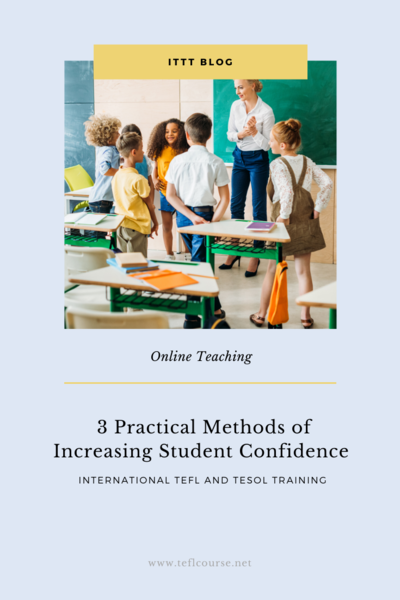3 Practical Methods of Increasing Student Confidence

When teaching English, teachers need to be aware of the issues that students will be dealing with. For my summative task, I would like to explore one of the biggest issues that I experienced while studying English, which is a 'confidence issue.'
Table of Contents
2. Choice of Learning Resources
3. Polite Correcting Techniques
Do you want to teach English abroad? Take a TEFL course!
This post was written by our TEFL certification graduate Mitsuki O. Please note that this blog post might not necessarily represent the beliefs or opinions of ITTT.
Consequences
Generally speaking, the issue of not being confident in language learning enormously affects students, especially when they are actually trying to use English for output exercises in both speaking and writing. To minimize this confidence issue and increase their confidence level, from my teaching perspective, there are several ideas that teachers can implement in the classroom.

Also Read: How can developmental psycholinguistic research help foreign English students?
1. Student Talking Time
To begin with, teachers should be giving students the chance to talk as much as possible in the classroom. Commonly, 'teaching' gives off an image where teachers are always talking and managing the class in front of the students. However, when it comes to teaching English, the one who should be talking more are the students. By bringing various activities that require students to talk, the teacher can focus on keeping students' talk time high throughout the lessons. Activities that keep students talk time high include memory games, discussions, partner information share, etc., and those can often be used for the engage phase and activate phase. By finding opportunities to speak in English a lot in the classroom, students will gain confidence when they communicate in English. Therefore, building rapport with all students and keeping the environment comfortable for students to use English is an essential goal for the teacher.
Also Read: Important Information about IELTS and TOEFL
2. Choice of Learning Resources
Secondly, using authentic materials will help students to build their confidence. Authentic materials are anything that native speakers would hear or read, including programs, magazines, newspapers, songs, poems, menus, films on video, etc. These real sources are motivating and interesting for students and could help them gain confidence when they realize that they can understand the nuances of English from an authentic cultural perspective. In fact, in my experience, I was very excited to watch English videos or movies in class when I was learning English. I was motivated to listen to the contents and understand them. These authentic materials piqued my curiosity and I was very happy and felt confident when I was able to hear and understand the phrases. I think these repeated experiences helped motivate me to learn and to be aware of improvements and where my language level was, which was exactly what I needed to gain confidence. As such, there are several benefits to using authentic materials. However, teachers have to be careful when choosing materials since those that are not designed for EFL students and not graded for level can be detrimental to student learning and confidence building. To use authentic materials effectively, teachers will be required to know the student's language level, to correctly choose the materials and to decide what to do with the materials.

Also Read: How much does a TEFL course cost?
3. Polite Correcting Techniques
Last but not least, it is important not to over-correct and try to give effective feedback. During the activities, teachers are required to evaluate students' performance to provide feedback but they should not jump in with instant corrections and should wait until the activities are done. Also, over-correcting could lead to a lack of confidence. Some activities are more concerned with fluency not accuracy and this is where students should see the improvement of their language skills by themselves. Also, the teacher's feedback will play a big role in encouraging students' self-awareness and improvements. The way of giving feedback should be positive, clear and audible. Teachers should always be on the lookout for points to comment upon even if mistakes have been made, and they have to make sure that they are allowing correcting their work.
Do you want to teach English abroad? Take a TEFL course!
In conclusion, to answer the question "How can teachers increase students' confidence in the classroom?" is to build a great rapport with the whole class. This will allow teachers to create an environment where students can keep their motivation to learn, is comfortable to use English all the time and to give feedback to each other. These actions will encourage students' self-awareness and then they will eventually gain the ability to set their goals on their own. When students obtain this a strong level of confidence, their English will surely improve.
Apply now & get certified to teach english abroad!
Speak with an ITTT advisor today to put together your personal plan for teaching English abroad.
Send us an email or call us toll-free at 1-800-490-0531 to speak with an ITTT advisor today.
Related Articles:
- 10 Tips for Teaching Grammar to EFL Students Abroad
- Top 10 Things To Know When Moving Abroad To Teach English
- 4 Top Tips For Getting Your TEFL Certificate on the Road
- What TEFL course is most useful?
- What's Stopping You from Teaching English Abroad?
- The Best Countries to Teach ESL When You're 50+




